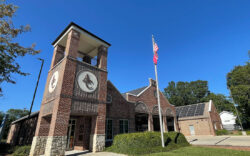The Athens-Clarke County Commission is considering a franchising proposal that would completely reshape how trash is collected in some parts of Athens, limiting consumer choice but improving efficiency and potentially lowering costs.
In the proposal, the county outside of the old city limits (the “urban services district” where ACC handles trash and recycling pickup) would be divided into five service zones with a single trash hauler permitted to operate in each. Every resident would be required to pay for trash service with the hauler operating in their zone.
Currently, the county allows residents in the “general services district” to choose between five private haulers or to haul their own trash to the landfill. If the commission decides to change to a franchising system, many residents living outside the Loop would need to switch their trash service to whichever company gains the franchising rights for the service zone they live in. Additionally, self-haulers would be required to pay for trash service for the first time.
The ACC Solid Waste Department would continue hauling trash and recycling in the city center, so residents living there would not be affected by this proposal.
Solid Waste staff believe that franchising would provide an enhanced level of service at a reduced cost. The proposal would also allow more control over private haulers, which could help ensure they adhere to a standard level of customer service. Furthermore, it’s likely franchising would reduce the traffic, noise, emissions and road wear that can come from having multiple heavy trucks operating on the same roads.
Finally, ACC staff believe that requiring all residents to have trash pickup will help reduce illegal dumping, which is a big problem in Athens. ACC staff estimate that Athens taxpayers spend at least $900,000 a year cleaning up after people who dump their trash illegally.
But not everyone is excited about this proposal. Former commissioner Andy Herod spoke up to oppose trash utility franchising during public comment at last week’s agenda-setting meeting.
“I highly doubt that creating a monopoly in different parts of the county for a particular hauler is going to reduce prices,” Herod said. “You’re not proposing to bring city trash out to the old county. Essentially what you’re saying is, ‘We’re not going to provide a service for you, but we’re going to tell you which hauler you can and cannot use,’ and I don’t think that’s fair.”
The reason why ACC staff aren’t suggesting expanding city trash collection across the entire county is that it would be prohibitively expensive in the short term without some way to fund the capital expense of purchasing a new fleet of garbage trucks.
The idea to switch to a franchising system for trash collection has been circulating in Athens for decades, but commissioners have never acted on it. The closest they came was in 2012, when the local government limited the number of trash haulers and required them to obtain a permit to operate.
Many commissioners had concerns about franchising, including Commissioner Mike Hamby, who suggested the idea should be killed in committee. “I haven’t yet heard a good rationale for us to do this,” Hamby said. “We need to move on from this. Send it back to committee… and just not let us see it again. [That] would be a really nice thing on your part. Put it in whatever trash can you want to.”
In disagreement, Commissioner Patrick Davenport, who chairs the ACC Solid Waste Advisory Commission, urged his colleagues to act on the measure. He said the current system is inefficient and creates both road damage and noise problems for residents. He also described how allowing people to haul their own trash can create a problem of service theft for local businesses, who often end up having to pay to haul trash that they don’t generate.
But the main reason Davenport supports franchising is the large cost of illegal dumping. “Everybody keeps thinking Solid Waste picks up our trash. That’s not true,” Davenport said. “Transit picks up our trash. Landscape Management picks up our trash. Leisure Services picks up our trash. Think about the court costs [of prosecuting illegal dumping]… We are spending $1.6 million annually just on illegal dumping and service theft… It’s ridiculous when we have so many needs in this community, that we waste money on [this and] think it’s OK to keep the status quo.”
The commission will vote on the franchising proposal on Nov. 6. If they vote in favor, which seems unlikely, the local government would hire a contractor to provide expertise as they develop the franchising ordinance and related contracts. At that point, the franchising system could be ready to start by September 2026.
Affordable Housing: Commissioners are considering approval of a mixed-used apartment complex on North Avenue near Ruth Street that would include some affordable units. The developer is asking for permission to build 128 apartments (260 beds in total), 20% of which would be rented for an affordable price for someone making 80% of the area median income.
The developer is also planning to include retail space and a gas station in the plan, which was controversial among commissioners because of the potential for adverse health impacts on nearby residents. “We need the housing, for sure, but we need housing that’s not next to a toxic, unnecessary gas station,” Commissioner Jesse Houle said.
Davenport and Commissioners Tiffany Taylor, Carol Myers and Ovita Thornton agreed that the health risks of having a gas station so close to residential buildings was a concern. Despite this, Commissioner Melissa Link encouraged her colleagues to support the development.
“From what I understand, the actual property owner is dead set on a gas station, and what they could do right now is go ahead and just build [it] with no housing whatsoever,” Link said. “Do we hate gas stations more than we love affordable housing?”
Houle, who has spent months trying to block developers from building any new gas stations in Athens without special approval, seemed irked by Link’s comment. “I am a little disappointed in the false [choice] of, ‘We have to choose this or we get a gas station by right,’ because I’ll remind everyone that we could change our code to not allow gas stations by right, which is the thing I have been asking this body to do for a year,” Houle said.
The commission will vote on the mixed-use development on Nov. 6.
Atlanta Highway Improvements: The Georgia Department of Transportation is considering a safety makeover for West Broad Street and Atlanta Highway from Hodgson Drive to Epps Bridge Road, and they’re asking the ACC Commission for their thoughts.
The changes being considered include numerous intersection improvements, lighting improvements, sidewalks, a multi-use path and a road diet from seven lanes to four lanes (plus left turn lanes at intersections) from Alps Road to Holman Avenue.
Commissioners seemed to support the idea, but they had a few concerns they wanted to pass along to GDOT. “I’m very excited about this project, “ Link said. “God knows that this stretch of West Broad is in need of desperate, desperate help. We’ve had many pedestrian fatalities, not to mention auto wrecks on the stretch.”
GDOT’s proposal calls for a median that would block cars from making left-hand turns in some areas. Link’s main concern was that she wanted to make sure a left turn onto Magnolia Street remained possible for westbound traffic on West Broad.
GDOT will cover most of the cost of the project, although the local government will need to provide about $3.5 million for a multi-use path and improved lighting along the corridor.
This project is in the very early phases. GDOT will reach out to the public for input before the design is finalized.
Like what you just read? Support Flagpole by making a donation today. Every dollar you give helps fund our ongoing mission to provide Athens with quality, independent journalism.









